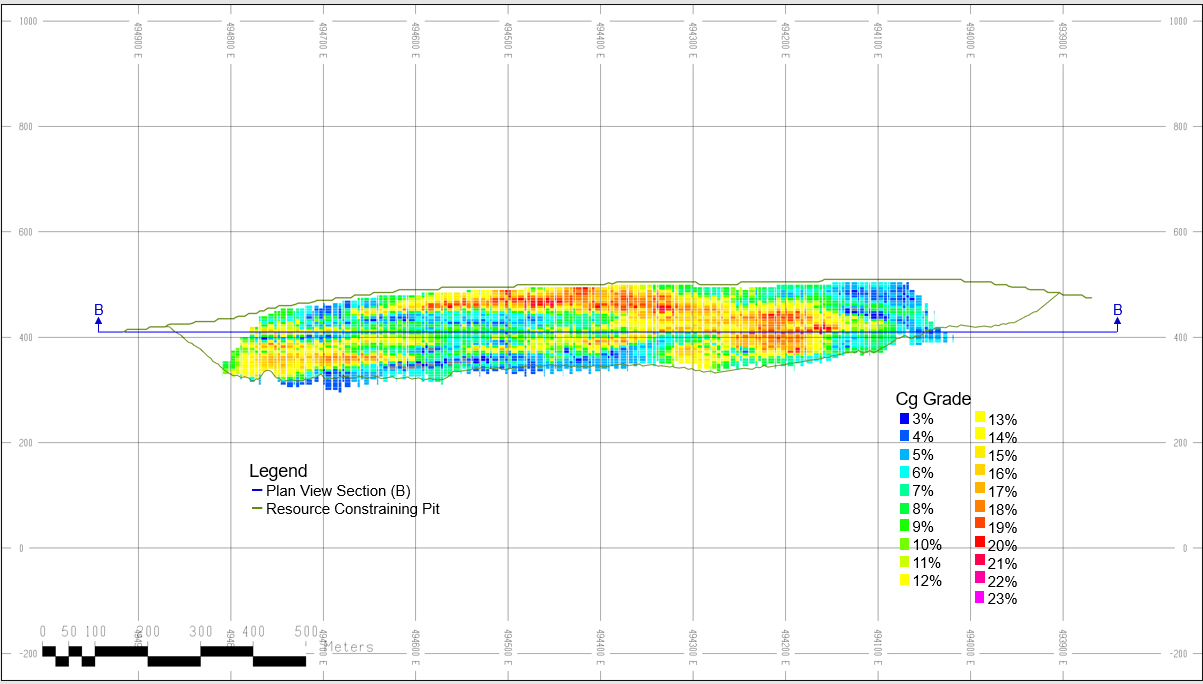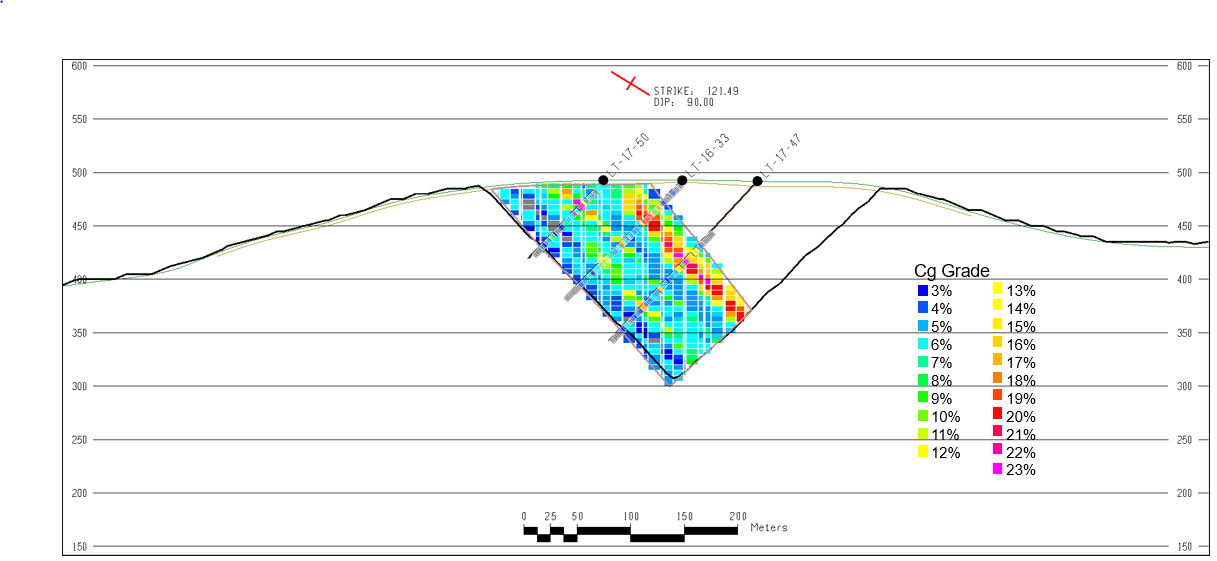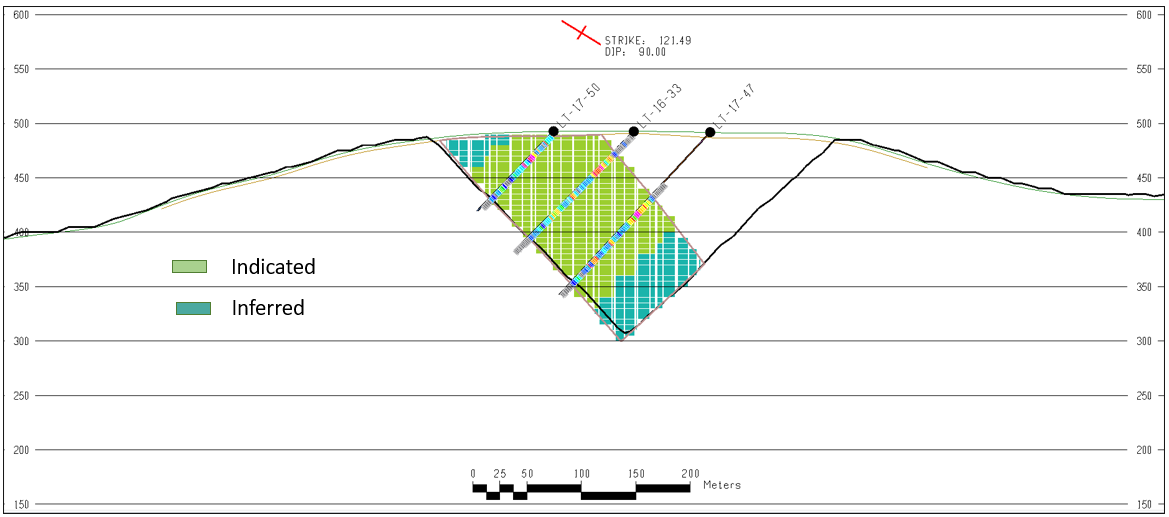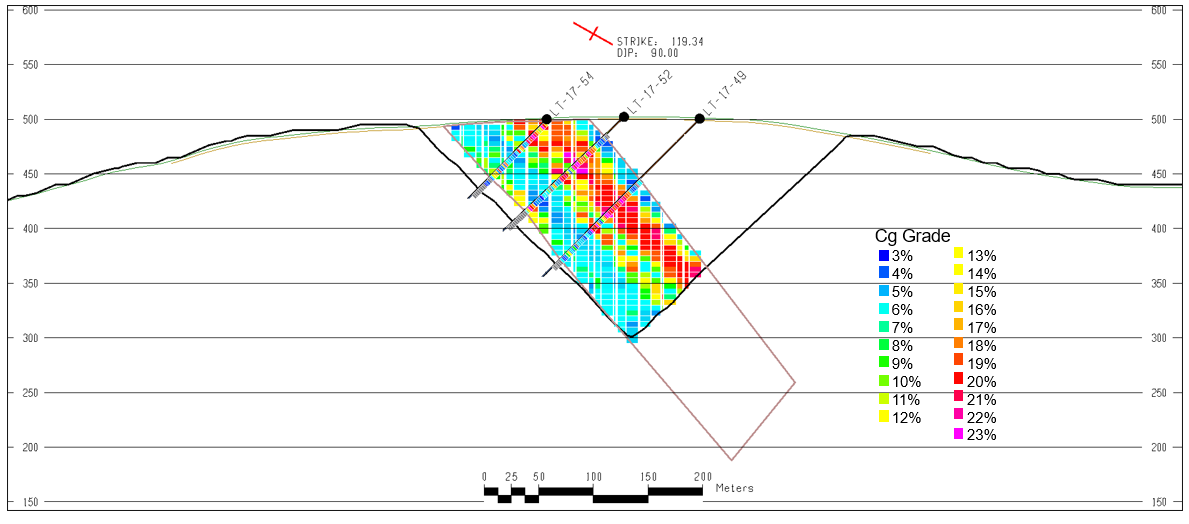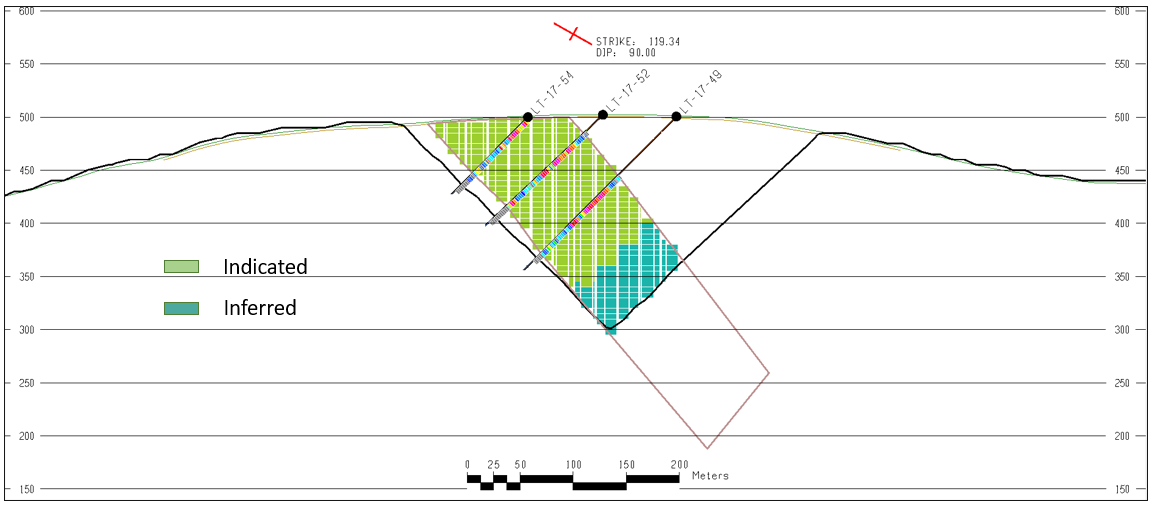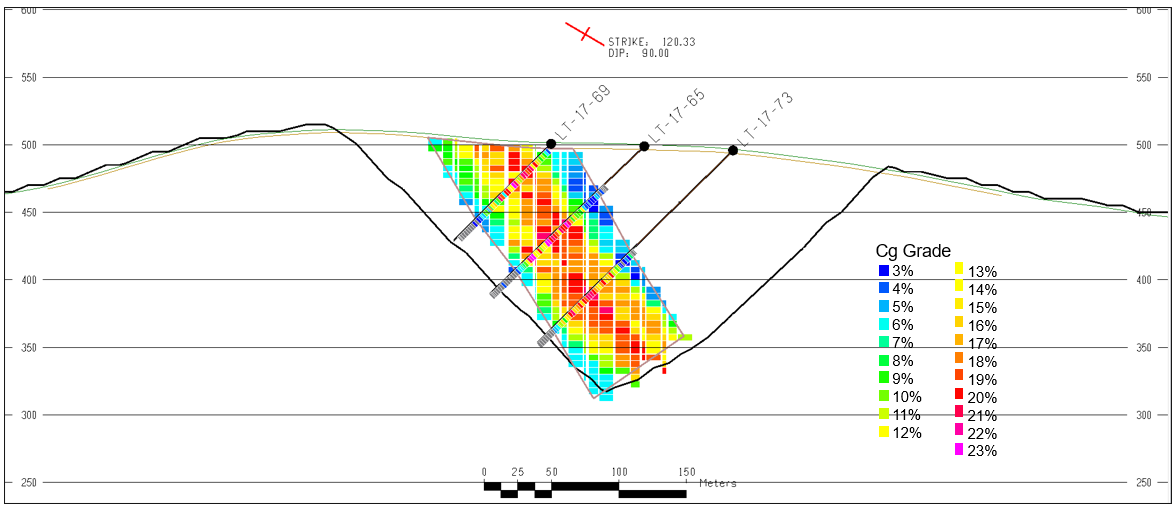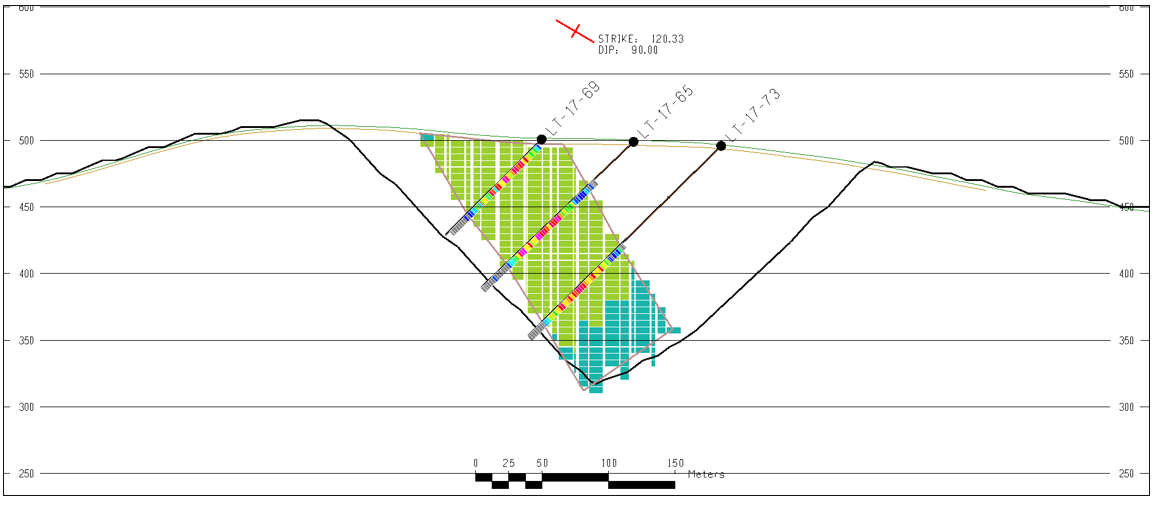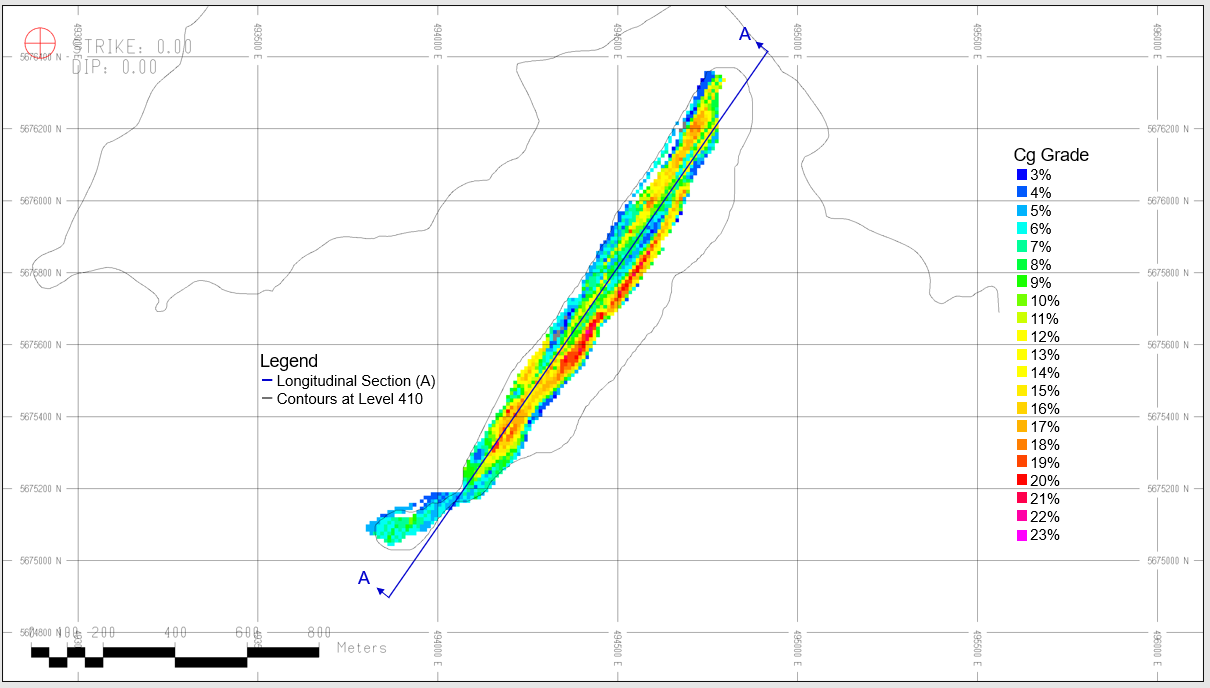Results include Indicated Mineral Resources of 59.3 Million Tonnes (“Mt”) grading 10.61% graphitic carbon (“Cg”), equivalent to 6.3 Mt of in-situ graphite, and suggest the deposit has the potential to become one of the largest sources of high-quality flake graphite in North America.
Kingston, Ontario, February 17, 2022 – Focus Graphite Inc. (TSX.V:FMS, OTCQX:FCSMF) (FRANKFURT:FKC) (“Focus” or the “Company”) is pleased to report its maiden mineral resource estimate for its 100%-owned Lac Tétépisca graphite project (the “Project”) located southwest of the Manicouagan Reservoir in the Côte-Nord administrative region of Québec on the Nitassinan of the Pessamit Innu.
The mineral resource estimate (“MRE”), prepared by DRA Global Limited’s (“DRA”) Montréal, Québec office, includes a pit-constrained Indicated resource for the Manicouagan-Ouest Graphitic Corridor (“MOGC”) Lac Tétépisca project of 59.3 Mt tonnes (“Mt”) grading 10.61% Graphitic Carbon1 (“Cg”) for an estimated content of 6.3 Mt of natural flake graphite (in-situ), and an Inferred resource of 14.9 Mt grading 11.06% Cg1 for an estimated content of 1.6 Mt of natural flake graphite (in-situ) (Tables 1, 2).
1A cut-off grade of 3.9% Cg was applied to all estimates.
Focus will file a technical report pursuant to National Instrument (N) 43-101 to support disclosure of the MRE on SEDAR (www.sedar.com) within 45 days of the issuance of this press release.
“The results of this maiden mineral resource estimate for the MOGC prospect have exceeded our expectations. They show the great potential of our Lac Tétépisca project, which we can now claim hosts one of the largest undeveloped flake graphite deposits in Québec,” said Marc Roy, President and CEO of Focus Graphite. “Along with our flagship Lac Knife graphite project, we now have two significant graphite deposits in Québec, which puts Focus in a strong position to occupy a vital link in the North American primary graphite supply chain. We aim to become a secure and reliable supplier of critical and strategic minerals to reduce North American dependence on foreign sources.”
Mr. Roy continued, “While our focus remains on bringing our flagship Lac Knife graphite project to commercial production, we will also begin investigating the best way to advance the development of our Lac Tétépisca graphite project. We plan to consult the communities that could potentially be impacted by the next stages in the development of the project to listen to their concerns and expectations and to offer them an opportunity to participate in project steering committees. We will also consult the Québec Government about potential incentives and initiatives that could help facilitate the development of the project and achieve social acceptability, particularly incentives provided under its Plan for the Development of Critical and Strategic Minerals 2020-2025. At the same time, we intend to continue exploring the remainder of the project or other significant flake graphite occurrences.”
Mineral Resources
Table 1: Mineral Resources (at 3.9% Cg Cut-Off) – MOGC, Lac Tétépisca Project.
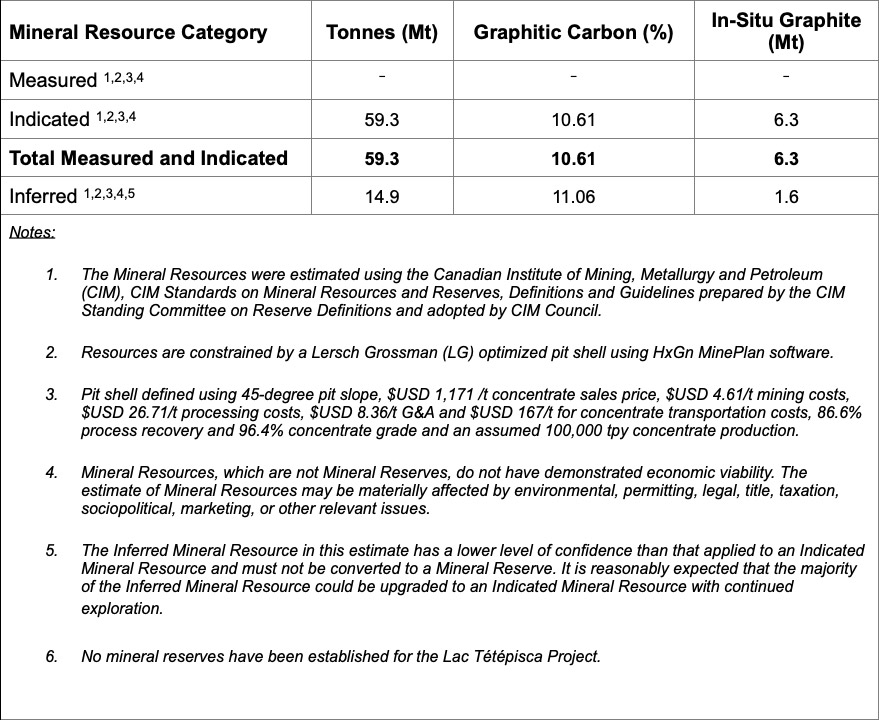
Table 2: Sensitivity Analysis.
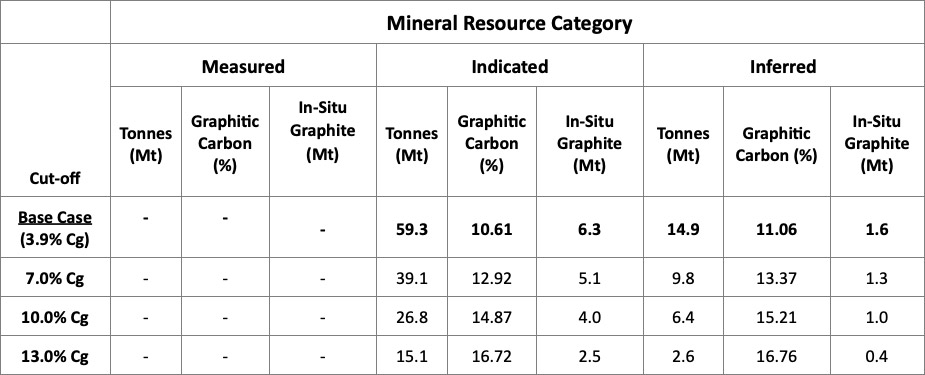
Plan and longitudinal views of the conceptual 2D pit shell with mineral resource blocks for the MOGC graphite deposit are available on the Company’s website at focusgraphite.com.
Resource Estimation Summary and Parameters
The maiden mineral resource estimate (“MRE”) for the Lac Tétépisca project is based on 106 inclined diamond drill holes performed between 2014 and 2020 on the Manicouagan-Ouest Graphitic Corridor (“MOGC”) graphite prospect, for a total of 16,467 metres. Focus discovered the MOGC prospect in July 2012 while conducting reconnaissance geological mapping, prospecting, and outcrop sampling on the Property. The MOGC is defined by a linear kilometre-long ground geophysical Magnetic (MAG) – Electromagnetic (EM) anomaly that trends N035o. Drilling was conducted in a 1.4 km long segment of the MOGC, along fences up to 300-metres long, with fences oriented N305o and spaced 100 metres, 50 metres or 25 metres apart.
The MRE for the MOGC deposit incorporates analytical results from a total of 5,177 core samples (QA/QC samples excluded), including: 625 samples sent for analysis in 2015, representing 16 drill holes; 946 samples sent for analysis in 2017, samples representing 18 drill holes; 2,168 samples sent for analysis in 2018, representing 42 drill holes; with the remaining 1,438 samples representing 30 drill holes being sent for analysis in 2021. Assays from the various programs were done using the same sampling, assaying and QA/QC procedures. The MRE is established for the unoxidized profile of the deposit, from surface to a vertical depth of about 200 metres with an average true thickness of about 85 metres. The deposit remains open along strike to the Southwest and at depth.
IOS Services Géoscientifiques Inc. (“IOS”) of Saguenay, Québec, designed and operated the drilling programs targeting the MOGC prospect for Focus or provided logistical and technical support, while Table Jamésienne de Concertation Minière (“TJCM”) of Chibougamau, Québec, provided independent project supervision services. Drilling was performed by Forages Rouillier of Amos, Québec, Forages Chibougamau of Chibougamau, Québec, and Forage G4 of Val D’Or, Québec.
Core logging, sampling and sample preparation were performed at the IOS laboratory facilities in Saguenay, Québec. Pulverized splits were then sent to COREM, an ISO/IEC 17025:2005 certified facility located in Québec City, for graphitic carbon (code LSA-M-B10) and total sulphur (code LSA-M-B41) analysis using LECO combustion in induction furnace with infrared spectrometry. The analytical quality control program for the Lac Tétépisca project was implemented by an IOS certified chemist. Approximately 10% of the samples were also analyzed by COREM for total carbon (code LSA-M-B45), organic carbon (code LSA-M-B58) and inorganic carbon (code LSA-M-B11). Duplicates of the same samples were sent to ACTLABS Laboratories of Ancaster, Ontario (ISO/IEC 17025:2005 with CAN-P-1579) for graphitic carbon (code 5D – C Graphitic) and total sulphur (code 4F – S Combustion infrared detection) determinations and for 35 trace element analysis using ICP-MS after an aqua-regia digestion (code 1E2 – Aqua Regia). Also, IOS inserted certified or internal reference material samples (CDN-GR1, CMRI12, Oreas-724, GLC-004, NSC-DC-60119, NSC-DC-60120, NSC-DC-60121), duplicates (quarter-split core, crushing or grinding duplicates), and blanks into the sample sequences representing about 15% of all samples for each of the four drilling programs.
The mineral resource estimate was prepared by Schadrac Ibrango, P.Geo (QC), PhD, MBA, Lead Geologist and Qualified Person (“QP”) for DRA. The geology was interpreted in 2D vertical sections followed by the construction of 3D envelopes of the mineralized zones. Three (3) mineralized zones were modelled; a principal one and two small grade zones. Compositing was made at a 2-metre length which represent the second statistical mode of the assays sampling length histogram. Block size of 10 m x 10 m x 5 m was selected based on the average drill spacing over the estimation domain. Geological modelling and mineral resource estimate were performed using HxGN MinePlan 3D (previously MineSight) with Cg% and Sulphur content (%) grades estimated using Inverse Distance Squared (“ID2”). No capping was applied on Cg% since its statistical distribution doesn’t show extreme high values population associated with a nugget effect. A mathematical regression model developed between density and Sulphur content was used to allocate a density for each block interpolated based on its Sulphur content.
Three (3) successive passes were used to inform all blocks within the estimation domain. In the first pass an ellipsoid of 40 m x 40 m x 40 m (sphere) was used and a maximum and minimum numbers of composites to interpolate a block were respectively set to 15 and 9. The maximum number of composites allowed for a single hole was set to 3. As consequence of the combination of both constrains a least three (3) holes are required to allow a block to be coded during this first pass. In the second pass an ellipsoid of 60 m x 60 m x 60 m (sphere) was used and a maximum and minimum numbers of composites to interpolate a block were respectively set to 15 and 6. The maximum number of composites allowed for a single hole was set to 3. As consequence of the combination of both constrains a least two (2) holes are required to allow a block to be coded during this second pass. The third pass has same parameters than the second pass with the exception that the ellipsoid was relaxed to 100 m x 100 m x 100 m (sphere). All ellipsoids were oriented according to a strike of 35⁰ and a dip of -55⁰. The oriented search ellipsoids were constrained within the mineralized grade/geological solids and no composite located outside the estimation domain was used for blocks interpolation. A preliminary open pit optimization algorithm was run on the estimated grade block model to constrain the resources and to support the Canadian Institute of Mining, Metallurgy and Petroleum’s (“CIM”) requirement that mineral resources have “reasonable prospects for eventual economic extraction.” Only mineralization contained within the preliminary pit shell has been included in the resource estimate.
The mineral resources have been classified according to the CIM definition for classification of Indicated and Inferred Mineral Resources. All blocks interpolated during the first and the second pass have been classified as Indicated Mineral Resources. All blocks interpolated during the third pass have been classified as Inferred Mineral Resources. A cut-off of 3.9 % Cg has been applied to disclose the estimated Mineral Resources.
The effective date of the MRE is September 17, 2021 which is the date of reception of the final version of the drill hole database.
Qualified Persons
DRA consultant Schadrac Ibrango, P.Geo. (QC), PhD, MBA, is responsible for estimating the mineral resources and has reviewed and approved the contents of this press release. Mr. Ibrango is a Qualified Person (“QP”), independent of Focus Graphite, within the meaning of NI 43-101 – Standards of Disclosure for Mineral Projects of the Canadian Securities Administrators.
Mr. Marc-André Bernier, géo. (QC), P.Geo. (ON), M.Sc., Senior Geoscientist for Table Jamésienne de Concertation Minière, a consultant to the Company and a Qualified Person as defined under National Instrument (NI) 43 – 101 Standards of Disclosure for Mineral Projects has reviewed and approved the non-technical content this news release.
About the Lac Tétépisca Graphite Project
Focus Graphite’s 100%-owned Lac Tétépisca Graphite Project comprises two contiguous properties, Lac Tétépisca and Lac Tétépisca Nord, located in the Southwest Manicouagan reservoir area of the Côte-Nord region of Québec, 234 km north-northwest of the city of Baie-Comeau, an industrial city located where the Manicouagan River intersects the north shore of the St. Lawrence River. Together, the two properties form a block of 115 map-designated claims (total area: 6,198.27 ha). Focus purchased a 100% unencumbered interest of the mineral rights in the 67 CDC claims constituting the original Lac Tétépisca property from a third party in August 2011. The Lac Tétépisca Nord property was map-staked by the Company in 2012. The Lac Tétépisca Project is accessible year-round by way of a network of secondary gravel roads that extend north from Highway 389, 10 km to the south of the Manic 5 hydroelectric power station.
Figure 1: Longitudinal section (N035o) through the conceptual 2D pit shell with mineral resource blocks at a cut-off of 3.9% Cg, MOGC graphite deposit (source: DRA, Feb. 16, 2022)
Figure 2: Section (L3+00S; N305o) through the conceptual 2D pit shell with mineral resource blocks at a cut-off of 3.9% Cg, MOGC graphite deposit (source: DRA, Feb. 16, 2022)
Figure 3: Section (L3+00S; N305o) through the conceptual 2D pit shell showing Indicated and Inferred mineral resource blocks at a cut-off of 3.9% Cg, MOGC graphite deposit (source: DRA, Feb. 16, 2022)
Figure 4: Section (L6+50S; N305o) through the conceptual 2D pit shell with mineral resource blocks at a cut-off of 3.9% Cg, MOGC graphite deposit (source: DRA, Feb. 16, 2022).
Figure 5: Section (L6+50S; N305o) through the conceptual 2D pit shell showing Indicated and Inferred mineral resource blocks at a cut-off of 3.9% Cg, MOGC graphite deposit (source: DRA, Feb. 16, 2022)
Figure 6: Section (L8+50S; N305o) through the conceptual 2D pit shell with mineral resource blocks at a cut-off of 3.9% Cg, MOGC graphite deposit (source: DRA, Feb. 16, 2022)
Figure 7: Section (L8+50S; N305o) through the conceptual 2D pit shell showing Indicated and Inferred mineral resource blocks at a cut-off of 3.9% Cg, MOGC graphite deposit (source: DRA, Feb. 16, 2022)
About DRA Global Limited
DRA Global Limited (ASX: DRA | JSE: DRA) (DRA) is a multi-disciplinary consulting, engineering, project delivery and operations management group predominantly focused on the mining and minerals resources sector. DRA has an extensive global track record, spanning more than three decades and more than 7,500 studies and projects as well as operations, maintenance, and optimisation solutions across a wide range of commodities.
DRA has expertise in mining, minerals and metals processing and related non-process infrastructure including sustainability, water and energy solutions for the mining industry. DRA delivers advisory, engineering and project delivery services throughout the capital project lifecycle from concept through to operational readiness and commissioning as well as ongoing operations, maintenance, and shutdown services.
DRA, headquartered in Perth, Australia, services its global customer base through 20 offices across Asia-Pacific, North and South America, Europe, Middle East, and Africa.
About Focus Graphite
Focus Graphite Inc. is an exploration and development company that seeks to produce flake graphite concentrate at its wholly owned Lac Knife and Lac Tétépisca flake graphite projects located in the Côte-Nord administrative region of Québec. As part of its mission to build long-term, sustainable shareholder value, Focus is also evaluating the feasibility of producing value-added specialty graphite products, including battery-grade spherical graphite. Focus Graphite is a technology-oriented graphite development company with a vision for building long-term, sustainable shareholder value. Focus also holds an equity position in graphene applications developer Grafoid Inc. Focus is committed to operating in a socially, environmentally and ethically responsible manner.
For more information about Focus Graphite and the Company’s Lac Tétépisca and Lac Knife projects, please visit Focus’s website at focusgraphite.com or contact:
Kimberly Darlington
Communications, Focus Graphite
kdarlington@focusgraphite.com
Judith Mazvihwa-MacLean
CFO, Focus Graphite
jmazvihwa@focusgraphite.com
(613) 581-4040
Neither the TSX-V nor its Regulation Services Provider (as that term is defined in the policies of the TSX-V) accepts responsibility for the adequacy or accuracy of this news release.
Forward-Looking Statements
This press release contains “forward-looking information” within the meaning of Canadian securities legislation. All information contained herein that is not clearly historical in nature may constitute forward-looking information, including references to the plans and project of the Company such as proceeding with production at the Company’s Project, proceeding with exploration activities on its permits on Lac Tétépisca. Generally, such forward-looking information can be identified by the use of forward-looking terminology such as “potential”, “high-potential”, “expected”, “optimistic”, “looking forward”, “moving forward”, or variations of such words and phrases or state that certain actions, events or results “may”, “could”, “would” or “might”. Forward-looking information is subject to known and unknown risks, uncertainties and other factors that may cause the actual results, level of activity, performance or achievements of the Company to be materially different from those expressed or implied by such forward-looking information, including but not limited to: (i) volatile stock price; (ii) the general global markets and economic conditions; (iii) the possibility of write-downs and impairments; (iv) the risk associated with exploration, development and operations of mineral deposits; (v) the risk associated with establishing title to mineral properties and assets; (vi) fluctuations in commodity prices; (vii) the risks associated with uninsurable risks arising during the course of exploration, development and production; (viii) competition faced by the issuer in securing purchasers, off-taker markets, clients and experienced personnel and financing; (ix) access to adequate infrastructure to support mining, processing, development and exploration activities; (x) the risks associated with changes in the mining regulatory regime governing the issuer; (xi) the risks associated with the various environmental regulations the issuer is subject to; (xii) risks related to regulatory and permitting delays; (xiii) risks related to potential conflicts of interest; (xiv) the reliance on key personnel; (xv) liquidity risks; (xvi) the risk of litigation; and (xvii) risk management.
Forward-looking information is based on assumptions management believes to be reasonable at the time such statements are made, including but not limited to, continued exploration activities, no material adverse change in metal prices, exploration, and development plans to proceed in accordance with plans and such plans to achieve their stated expected outcomes, receipt of required regulatory approval, and such other assumptions and factors as set out herein. Although the Company has attempted to identify important factors that could cause actual results to differ materially from those contained in the forward-looking information, there may be other factors that cause results not to be as anticipated, estimated or intended. There can be no assurance that such forward-looking information will prove to be accurate, as actual results and future events could differ materially from those anticipated in such forward-looking information. Such forward-looking information has been provided for the purpose of assisting investors in understanding the Company’s business, operations and exploration plans and may not be appropriate for other purposes. Accordingly, readers should not place undue reliance on forward-looking information. Forward-looking information is given as of the date of this press release, and the Company does not undertake to update such forward-looking information except in accordance with applicable securities laws.


